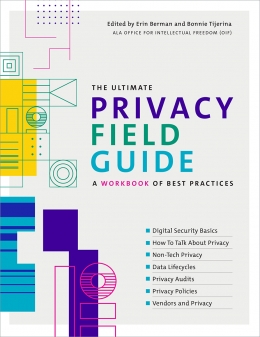Primary tabs
You don't need to be an ALA Member to purchase from the ALA Store, but you'll be asked to create an online account/profile during checkout to proceed. This Web Account is for both Members and non-Members. Note that your ALA Member discount will be applied at the final step of the checkout process.
If you are Tax-Exempt, please verify that your account is currently set up as exempt before placing your order, as our new fulfillment center will need current documentation. Learn how to verify here.
- Description
- Table of Contents
- About the authors
- Reviews
Designed for use in school, public, and academic settings of all types and sizes, this easy-to-use workbook is packed with practical, hands-on exercises to guide you towards creating a more privacy-focused library.
Privacy is a core value of librarianship, yet it often feels like an overwhelming and onerous undertaking. With the creation of ever larger datasets and methods to track users’ every movement, library workers need to have a deep understanding of privacy, confidentiality, and security. Written by library privacy experts and based on input and guidance from a wide cross-section of stakeholders, this resource is structured to give library workers the tools needed to create and be advocates for privacy-protecting practices and policies. Complete with an introduction to each topic and several exercises for you to implement privacy changes at your library, with the help of this guide you will
- learn about creating strong passwords, multifactor authentication, how to avoid malware, and other basic digital security concepts as well as where to go for more help;
- be able to communicate the importance of privacy and why libraries should care by understanding the people you are trying to reach;
- navigate areas in your physical library space to help protect users’ privacy;
- see how user data travels through the library and what you can do to protect it;
- build an audit framework, perform an audit, and tell the audit story;
- read, understand, and write privacy policies applicable to your library; and
- gain key strategies to employ while protecting user privacy when engaging vendors.
Acknowledgments
Introduction
Chapter 1 Digital Security Basics
Chapter 2 How to Talk About Privacy
Chapter 3 Non-Tech Privacy
Chapter 4 Data Lifecycles
Chapter 5 Privacy Audits
Chapter 6 Privacy Policies
Chapter 7 Vendors and Privacy
Index
Erin Berman
Erin Berman is a fierce privacy advocate, leading the American Library Association’s Privacy Subcommittee from 2018 - 2022. During her time as Innovations Manager for San José Public Library, she published the book Your Technology Outreach Adventure: Tools for Human-Centered Problem Solving. Currently, she works as the Division Director of the Learning Group for the Alameda County Library in California.
Bonnie Tijerina
Bonnie Tijerina is a researcher, librarian, and community convener. She is currently focused on creating opportunities for education and discussion within the library profession and beyond on the role libraries and librarians can play around the increasingly complex issues of the digital world. In that space, she has worked on several grant-funded projects around privacy and big data research ethics and is the co-editor of Protecting Patron Privacy: A LITA Guide. She is also the founder and annual coordinator of the Electronic Resources & Libraries Conference.
Office for Intellectual Freedom (OIF)
ALA's Office for Intellectual Freedom (OIF) is charged with implementing the intellectual freedom policies of the American Library Association through educating librarians and the public about the concept of intellectual freedom as embodied in the Library Bill of Rights, the Association's basic policy on free access to libraries and library materials. In order to meet its educational goals, the Office undertakes information, support, and coordination activities.
Have you read this book? Leave a review!
"The information in each section is divided into clear headings, allowing readers to locate relevant information quickly. Additionally, most sections contain exercises for readers to practice their knowledge ... A very useful handbook for librarians looking to increase patron privacy protections at their libraries."
— Library Journal
"Library workers at all levels will be empowered to support the privacy rights of their patrons after reading this useful guide."
— Booklist
"The highlight of this workbook is its readability. The authors don’t focus on deep theory or philosophical discussions about privacy. Instead, their intent is to provide the practical foundation necessary to implement policies and practices to protect patrons ... This book is highly recommended for any college or research library in the early stages of exploring privacy practices or that are looking to improve their current ones. It may also appeal to an even larger audience, exploring how library associations and consortia can use this work for wider, collective change in prioritizing privacy. The holistic approach that the editors outline, from the user level of passwords, to the data lifecycle of what information libraries collect, to how librarians can navigate vendor policies and contracts, properly illustrates the interconnectedness of library privacy issues and how librarians can address it."
— College & Research Libraries



